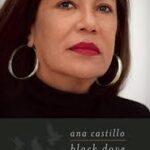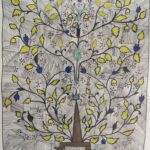Black Dove Song: Christmas 2022 Reflections
I received an early Xmas gift this year.
It’s this song (click above) composed for a class project. I’m thankful to the professor who assigned my book. Motherhood, mothering, being a mother…what can I add that hasn’t been said? I think of the Blessed Virgin Mary who was to have given birth as a virgin, a teenager from the most humblest of backgrounds. (I think of Melania Trump who bathed her only son in some ultra costly something to make his skin pearl white… ) I think it’s a lovely song. On behalf of my family and I thank you and best wishes for healthy holidays.

Here are some notes from the student and song composer’s email:
1- Lyrics pulled from page 275. I changed ‘go’ to ‘fly’ in the last line because it fit the flow, and I believe, the message. The context changes as a result.
2- Lyrics pulled from page 125, when Ana was near death.
3- Lyrics pulled from page 180, from Pablo Neruda’s poem. Just the first line.
4- Lyrics pulled from page 192, talking about Mi’Jo’s release.
5- Lyrics pulled from page 200, when Mi’Jo was talking about the days and life ahead of him.
6- Lyrics pulled from page 262- when Ana’s Ma refused to join her in the public’s eye. ‘We’re’ is intended to be interpreted as her family and ancestors. It can also be interpreted as folks fighting the same fight (vocally, not silently).
7- Lyrics pulled from page 212. Mountains represent white supremacy in this case, but could also represent the world of oppressed people that are unaware how to change the world.
8- Lyrics pulled from page 235. The line was written directly from my perspective, but intended to universally stand with people living in oppression.
This song was written based on the book Black Dove e by Ana Castillo, following her life and experiences as a Chicana woman. The goal was to write a song that was responsive to her and her people’s situations and experiences, without telling their story or appropriating their culture.
The form is AABA, verse verse chorus verse formatted; the verses are meant to follow Ana’s life in a loose timeline fashion, while the chorus is meant to universalize the song. Verse 1 is meant to depict Ana as a young woman stepping into the shoes of the person she’s meant to be. Verse 2 is meant to depict Ana as a working mother, with responsibilities of family, along with the struggles that come with raising a child while being a Chicana Feminist author. Verse 3 is depicted later in Ana’s life, when she is becoming the grandmotherly role model with work left to do in the world.
While the verses are obviously about Ana’s story, I stand by the argument that the song is not meant to tell her story. The perspective I wrote from was my own, but I believe that the first person narrative allows for interpretation of Who that person could be, whether it’s the author, ancestors still pushing for revolution, or anyone fighting for universal equality. I felt like I was alongside Ana in her story, much like one follows along the protagonist of any good novel, though in this case, the story is grounded completely in reality. The goal was to universalize the ‘black dove’ without any whitewashing, for we are a reflection of our role models.
To the question of how institutions and social systems of power and oppression shape individual lives within the context of family, I would say that Ana’s story is a story of beating the odds, and her life has become a symbol of hope and potential for Chicana women, and anyone really, while also paving the way for Chicana women in American society. Through a lifetime of hard work and struggle, she has helped shape the trajectory for Latina women. The line ‘If you see God in her Eyes, then I’ll testify’ is meant to embody the social revolution of change in the way we see things.
Special thanks to Clifford Cameron on piano, Josie Lawrence on vocals, and my Dad, Brady Harris, for mixing the audio. I could not have completed the task without any of them.
After completing this project and listening back, I’ve decided some lyrics need tweaking. I’m thinking the first line of the second verse should repeat the opening line, “Black Dove won’t you come on down, ‘cause you’re flying too high.

